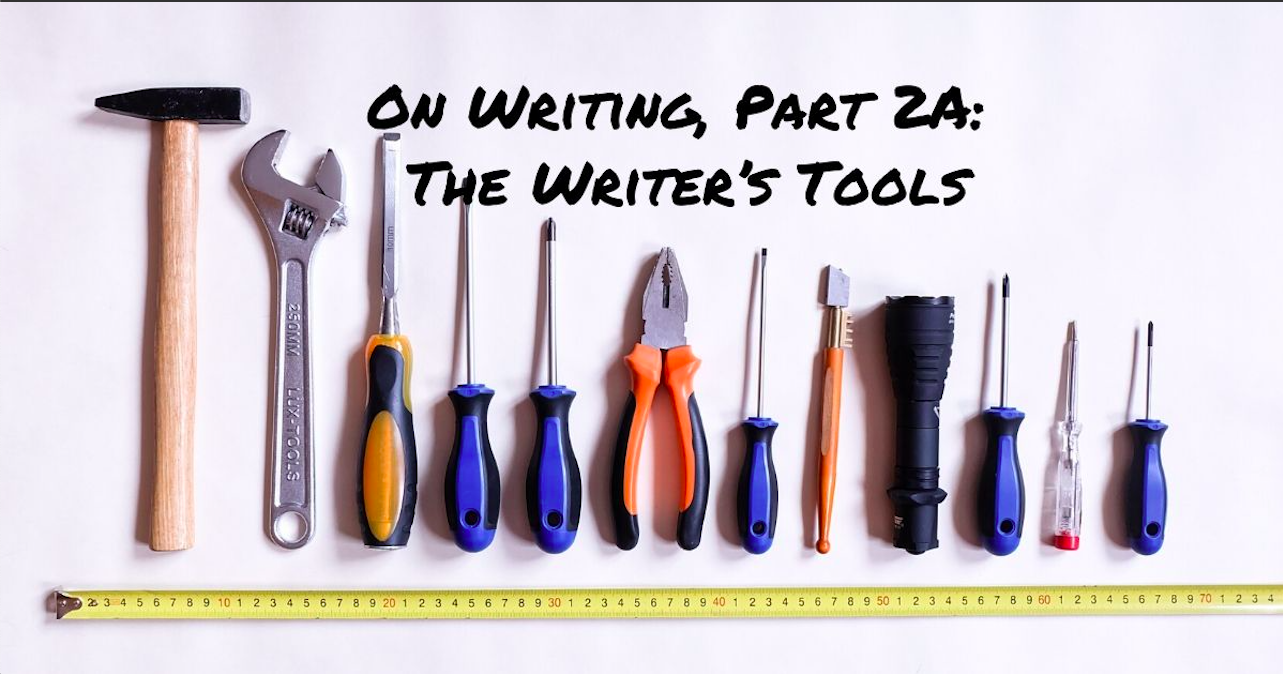Because everyone loves a good story
On Writing, Part 2A: The Writer’s Tools

“I’m convinced that fear is at the root of most bad writing,” says Stephen King in his book On Writing (127).
What kind of fear is he talking about? Fear that you’ll appear unintelligent if you don’t beef up your vocabulary. Fear that you’ll be misunderstood if you don’t use loads of adverbs, passive sentences, and hokey verbs of dialogue attribution (she insinuated insinuatingly). And fear that you just don’t have what it takes to write.
While King does admit that not everyone is born to be a writer, he also admits that decent writers can become good writers if they’re willing to put in the effort. The principles below apply to those who aspire to see their novels atop the best seller list, but they also apply to those who write emails, updates, and even texts. To that end, here are some tools that King proposes should fill every writer’s toolbox.
TOP SHELF: The Basics
Vocabulary
In the writer’s toolbox, “common tools go on top,” and the most basic of all is vocabulary. It’s fairly non-negotiable. But that doesn’t mean you should memorize the thesaurus so you can impress readers with your vice-like grasp of the English language. To the contrary, King suggests that faking a big vocabulary is a big mistake.
“One of the really bad things you can do to your writing is to dress up the vocabulary, looking for long words because you’re maybe a little bit ashamed of your short ones. This is like dressing up a household pet in evening clothes. The pet is embarrassed and the person who committed this act of premeditated cuteness should be even more embarrassed” (117). I couldn’t agree more, both with the advice and the analogy. (Who are these people who buy doggy dresses??)
So when in doubt, choose to word it simply. No one is fooled by fake-fancy writing anyway. King’s final vocabulary advice is worth memorizing: “Remember that the basic rule of vocabulary is use the first word that comes to your mind, if it is appropriate and colorful” (118). I couldn’t have said it better myself, Steve.
Grammar:

Another non-negotiable in the writer’s toolbox is good grammar. Why? Because “bad grammar produces bad sentences,” and bad sentences are confusing (120). We’ve all felt befuddlement (and some of us have felt scorn and outrage) when reading a poorly-written billboard. How, we wonder, did that message make it all the way into print without being edited? And what on earth were they trying to say? When it comes to correct grammar, King is unapologetic about its importance. If that makes you nervous, take heart. In his opinion, either you’ve picked up good grammar by hearing and reading good grammar, or else it’s too late for you and you probably shouldn’t pursue a career in writing. That’s pretty simple, right?
But even for those who have managed to pick up good grammar, there’s always room for fine tuning. I earned my degree in English Education with a minor in Creative Writing, so I’ve taken more nitty-gritty grammar courses than I care to remember. Sheesh, I’ve taken way more than I do remember. That’s why I—yea, verily, even I—have to check my punctuation and usage all the time. Fortunately, the interweb has plenty of great resources like the Purdue Online Writing Lab—OWL. I find their explanations clear and helpful. When in doubt, don’t be a dunce—look it up!
IN CONCLUSION
In pursuit of brevity, I’m choosing to close the writer’s toolbox until next time. The reminder to simplify our vocabularies and correctify our grammar is enough to keep us busy for the time being, right? I know it is for me. I feel like I should have looked up a couple of the words in this paragraph to make sure they were legit, but oh well. Maybe no one will notice. Until text time, keep writing gooder!

Pingback: On Writing, Part 3: Good Habits – Past Watchful Dragons
Pingback: On Writing, Part 2B: The Writer's Tools – Past Watchful Dragons
Well it’s clear I shouldn’t pursue a career in writing since it’s too late for my grammar to improve! Glad you are though!
p.s. Forget Steven King’s line, your last sentence was way gooder and worth memorizing.